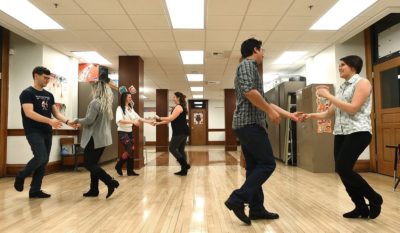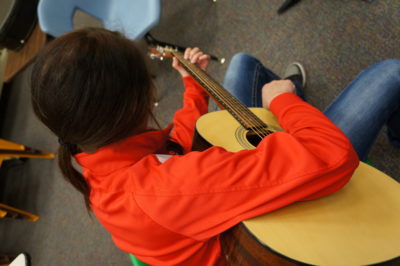YBGR on Montana Matters discussing the need for Therapeutic Foster Care parents
YBGR on KTVQ Announcing Expansion of the Chemical Dependency Program
YBGR TEAMING UP TO HELP VETERANS
(Billings, MT) January 30, 2018− It doesn’t need to be Veterans Day to support and honor our brave heroes. Any day is a great day to show our gratitude to the men and women who selflessly defended our freedoms and liberties. Yellowstone Boys and Girls Ranch (YBGR) showed their appreciation of veterans by donating jams and jellies made by students in Yellowstone Academy’s Vocational Technology program. All fruit is grown on YBGR’s 410-acre campus on the west end of Billings. YBGR youth tend to the plants, harvest, clean and process all the fruit that they then turn into jams and jellies. The process teaches youth valuable life skills such as patience and dedication. It also gives youth the opportunity to learn about the significance of giving to others.
 Yellowstone Academy’s vocational education teacher Jim Klempel and YA Para educator Robert Sipes teamed up recently with Chris Grudzinski, founder of Montana Veterans Meat Locker and current board member of Montana Wounded Warriors to distribute jams and jellies to veterans. For Robert Sipes this project is near and dear to his heart, he is a combat veteran of Desert Storm and understands the struggles that veterans face. “They are a lot like the struggles our kids face at YBGR and YA” Robert said.
Yellowstone Academy’s vocational education teacher Jim Klempel and YA Para educator Robert Sipes teamed up recently with Chris Grudzinski, founder of Montana Veterans Meat Locker and current board member of Montana Wounded Warriors to distribute jams and jellies to veterans. For Robert Sipes this project is near and dear to his heart, he is a combat veteran of Desert Storm and understands the struggles that veterans face. “They are a lot like the struggles our kids face at YBGR and YA” Robert said.
Veterans Meat Locker, a non-profit organization provides free professionally processed meat for veterans and their families, was started by Chris and his wife in 2016. The meat is donated by Montana hunters and ranchers, then processed and package at a discount by 4th Ave Meat Market and stored in a walk-in freezer donated by the owners of Popeye’s Louisiana Chicken Restaurants for distribution to qualifying veterans.
Chris, being an Iraq and Afghan veteran himself, wanted to show his gratitude to his fellow veterans by providing what he calls “therapeutic food.” Chris travels around the state of Montana delivering ample free meat to veterans at their request, no questions asked about income. They simply provide a VA card, DD214, or any other valid proof of service. These trips will now include jams and jellies lovingly made by YBGR youth for the veterans to enjoy. Chris says, “I like to shake each veterans hand and thank them for their service”.
Before the sun set on the day these two non-profit joined forces, Chris delivered  meat and jam to a Vietnam Veteran named David. David recently finished chemotherapy treatment and was excited to enjoy some toast with the jam. He said this was perfect since he had lost a lot of his taste for anything during his treatment, but jam was something he could still enjoy. Chris said of YBGR’s donation “I want everyone to know that they are a part of something so big yet so secret, the appreciation for so many Veterans that have never felt that their service mattered or was appreciated. This small, yet huge gesture of food as the jam represents is one of the three basic necessities in live. This precious gift has warmed David’s heart and gave him something he has been needing.”
meat and jam to a Vietnam Veteran named David. David recently finished chemotherapy treatment and was excited to enjoy some toast with the jam. He said this was perfect since he had lost a lot of his taste for anything during his treatment, but jam was something he could still enjoy. Chris said of YBGR’s donation “I want everyone to know that they are a part of something so big yet so secret, the appreciation for so many Veterans that have never felt that their service mattered or was appreciated. This small, yet huge gesture of food as the jam represents is one of the three basic necessities in live. This precious gift has warmed David’s heart and gave him something he has been needing.”
Yellowstone Boys and Girls Ranch has been providing services for emotional troubled youth and their families for over 60 years. YBGR youth feel so blessed and proud to be able to give back to communities and veterans. “We wanted to give back for what they all (veterans) did and what they have sacrificed and show appreciation for them and their families” said Jim Klempel.
For more information and how you can help the Montana Veterans Meat Locker visit www.facebook.com/vetmeatlocker
For more information on Montana Wounded Warriors visit www.montanawoundedwarriors.org
YBGR Chemical Dependency Expansion
Yellowstone Boys and Girls Ranch (YBGR) has announced the expansion of its Chemical Dependency (CD) Program after receiving licensure from the State of Montana. YBGR will be providing additional programs in Montana to include: Outpatient and Intensive Outpatient Chemical Dependency Treatment, Chemical Dependency Screenings and Evaluations, Family Chemical Dependency Counseling, and Prevention Education services for youth. According to Walter Shore, Director of Chemical Dependency at YBGR, “Our youth deserve the opportunity to experience life without being under the influence of alcohol and drugs and know that someone is there to help.”
Shore further explains that “youth are starting at an alarmingly younger age abusing substances and Montana’s current treatment services are not able to address the high rates of children and adolescent alcohol and drug use.” YBGR has seen an increase in youth dually diagnosed with both Substance Use Disorder and Mental Health Disorders. Early intervention of both disorders is key to preventing higher levels of treatment interventions later in life.
YBGR currently offers CSCT (Comprehensive School and Community Treatment) along with CD services in the Laurel School District and at Medicine Crow and Riverside Junior High Schools in Billings. The CD services include Chemical Dependency Screenings and Evaluations, along with ongoing Chemical Dependency Therapy Services. Youth placed at YBGR’s Psychiatric Residential Treatment Facility (PRTF) in Billings receive Chemical Dependency Evaluations, Substance Abuse Screenings, and Early Intervention/Education Services. Youth also participate in Chemical Dependency Counseling that includes Group (including Alcoholics Anonymous and Narcotics Anonymous), Individual, and Family Therapy Services.
Yellowstone Boys and Girls Ranch is a multi-service organization providing a broad spectrum of services including Psychiatric Residential Treatment, Case Management Services, Care Coordination, Home Support Services, Therapeutic Youth Mentors, Therapeutic Foster Care, Chemical Dependency, CSCT, Supported Employment, Outpatient Therapy Services, Psychological Testing and Day Treatment.
For additional information on Yellowstone Boys and Girls Ranch visit its website at www.ybgr.org or call 800-726-6755.
“Never doubt that a small group of thoughtful committed citizens can change the world. Indeed, it is the only thing that ever has.” ~ Margaret Mead
Yellowstone Boys and Girls Ranch is honored to welcome our newest board members Wendy Keating and Gary Tognoni to YBGR’s Board of Directors. They are in great company with board members Bob Carr, Chip Youlden, Perry McNeese, Terry Moore, Bill Goodwin and Bob Wilmouth. Wendy Keating who is presently in Washington was able to join the meeting via Zoom, pictured center on a tablet.


YBGR’s 60th year serving troubled Montana kids
Billings Gazette December 25th, 2017
Christmas for emotionally troubled youth served by Yellowstone Boys and Girls Ranch on campus, in foster homes, and even living at home, can be a lonely time. We want to give our heartfelt thanks to all our friends in the community who supported Yellowstone Boys and Girls Ranch Foundation and Yellowstone Boys and Girls Ranch this year with your time, talents and treasure.
This year marked YBGR’s 60th year of serving emotionally troubled children in our community. Each day, YBGR serves more than 650 emotionally troubled children. Its residential program hosts children on the original 410-acre working ranch between Billings and Laurel. YBGR’s community programs are based out of Garfield School on Billings’ Southside, providing therapeutic foster homes, school-based therapy, and family therapy and support throughout southern and eastern Montana. Yellowstone Academy, an accredited public K-8 and private high school, provides special education to YBGR’s residential children and day treatment students from our community and surrounding communities.
As we head into YBGR’s 61st year, we are also thankful for the board members, volunteers, and more than 325 employees of YBGR and Yellowstone Academy who selflessly help these emotionally troubled children day in and day out — and especially at Christmas.
Bill Hritsco, president
YBGR Foundation
Mike Chavers, CEO
Yellowstone Boys and Girls Ranch
http://billingsgazette.com/opinion/letters/ybgr-s-th-year-serving-troubled-montana-kids/article_919bd090-a9e4-5b3f-8c72-f9a4f37c8474.html?utm_medium=social&utm_source=email&utm_campaign=user-share
Swing Kidz dance to prevent suicide

Swing Kidz dance group performers rehearse at Broadwater Elementary on Monday.
Larry Mayer Gazette Staff
Billings Gazette 11/29/17 by Jaci Webb
They call themselves the Swing Kidz, a name that fits their dance style and personalities.
The Billings dance company primarily performs West Coast Swing, but they also like to throw in some hip hop and modern interpretative dance styles. They are such a tight-knit bunch that they call their dance instructors Mom and Dad, even though Patricia Lambert and her husband Jarrett Lambert are in their mid-20s.
The family atmosphere at dance practice helps boost spirits when a member is having a bad day. That spirit of caring helped them come up with the theme of suicide prevention and depression awareness for their upcoming dance performance, Swing Kidz Extravaganza.
The performance will be held on Saturday, Dec. 9, at 6 p.m. at the First Congregational Church, 310 N. 27th St. Proceeds from the auction and raffle will go to the Yellowstone Boys and Girls Ranch and a representative from the facility, which helps youths struggling with emotional issues, will speak during the event. Tickets are $15.
It begins with a swing dance lesson and finishes with a dance party after the performance. Patricia Lambert said dance makes a difference in kids’ lives and she can attest to that because she was once that shy kid.
“I went from not being able to speak in public to starting my own business. Dance did that for me,” Lambert said.
Swing Kidz is open to youths between age 6 and 24. The program currently has six students from age 6 to 18. The youngest member is 6-year-old Gabi Spatzier, who has been dancing since she was 2.
Gabi’s mother, Sam, said dance helps Gabi cope with her anxiety.
“I’ve never seen her more excited than she was the first day she started dancing with this group,” Sam Spatzier said.
Beverly-Ruth Laci, an 18-year-old music education major at Montana State University Billings, has been in the group since August. Laci thought raising money to help the Yellowstone Boys and Girls Ranch was an excellent idea.
“The message I want to get across is, ‘It’s OK to get help,’ ” Laci said.
Laci said she struggled with depression and anxiety because she was reluctant to reach out for help. She doesn’t want others to suffer.
An Oregon dance instructor that Lambert and two of her students worked with committed suicide earlier this year. That was a wake-up call for them.
“All of the kids have either experienced depression or someone they know has,” Lambert said.
As she worked with students at rehearsal Monday night, Lambert kept things lively. The music was loud and the pace was steady. Girls dance with other girls since there is only one male member of Swing Kidz.
Alex Hunnes, a 17-year-old Senior High student, said even though he’s the only boy in the group, the other members are some of his closest friends.
“It’s like a family. If anyone in the group is having a problem, we’re always there for each other. Today, Beverly got a flat tire and everyone in the group was wondering how we could help.”
Hunnes discovered dance two years ago when he was at a fiddle camp. He started watching YouTube videos and then saw the Lamberts perform during a John Roberts Y Pan Blanco concert featuring Latin music at St. John’s Lutheran Home.
Earlier this year, Hunnes competed in a swing dance competition in Boston, making finals in the Jack and Jill division, which has dancers rotate partners.
Hunnes believes dance helps relieve stress, which is important to people in his age group.
“People feel super connected in the virtual world, but not in the real world,” Hunnes said.

Gazette opinion: Save Montana kids’ mental health care
Gazette opinion: Save Montana kids’ mental health care
Nov 5, 2017

Yellowstone Boys and Girls Ranch is caring for nearly 600 kids, but only 65 were living on the sprawling campus along 72nd Street West last week. The other children and teens receive YBGR’s help in their schools, their homes or foster homes. It’s that big group of kids who would be hurt first and worst if the state cuts its budget.
Youth in-home care and targeted case management are on the chopping block, even though they are key to helping emotionally disturbed youth stay safe in their own homes.
YBGR, which celebrates its 60th anniversary this year, serves Montana through community offices in Dillon, Livingston, Lewistown and Billings. Those services include 32 school-based treatment teams in Billings, Laurel and other Montana public schools.
Kids on the campus west of Billings suffer serious illnesses, including major depression and PTSD resulting from abuse. Many have engaged in self-harm, such as cutting or suicide attempts. About half have chemical dependencies or are at high risk for addiction.
The vast majority of YBGR services are provided through Medicaid. The fiscal year began with zero rate increases for Medicaid mental health care. YGBR and other Montana health care providers already were struggling to pay salaries that will recruit and retain professional staff.
“Medicaid does not cover our costs,” YBGR Chief Executive Officer Mike Chavers said in an interview last week. “Our donors and foundation help.”
Starting and resuming children’s mental health care isn’t like flipping a light switch on and off. If disturbed youth are cut off from treatment, they will regress; they may need a higher level of treatment because they couldn’t access the less expensive care when they needed it. If in-home work with parents and dysfunctional families suddenly ceases, problems will grow.
“Most cuts are focused on low-cost services that serve a lot of people and divert them from higher cost care, hospitals and juvenile detention,” Chavers said. “Cutting down in this area doesn’t save money, it drives costs elsewhere. Let’s figure out ways to drive kids to better outcomes and bring kids home.
Of course, the state needs to control the costs of its high-end kids’ mental health care, too. It’s currently paying $327 a day for residential treatment, but that rate, which doesn’t fully cover costs of care, is under the budget axe, too.
DPHHS Director Sheila Hogan and division heads are “open to thinking creatively,” Chavers said. “The challenge is there is so much noise in the system, nobody knows what’s going to happen. There’s no easy way to make 10 percent budget cuts.”
The state absolutely can improve the system. Montana public health officials should work with in-state residential treatment centers to send fewer troubled kids out of state for care. Montana needs to invest enough in community-based services to prevent kids from deteriorating till they need to be hospitalized. DPHHS must step up engagement of providers, clients and their parents to plan better, more cost-effective services. But none of this will save the general fund the $100 million DPHHS could lose this biennium to balance the state budget.
As Chavers said, “There are ways we can improve the system, but it takes time.”
http://billingsgazette.com/opinion/editorial/gazette-opinion-save-montana-kids-mental-health-care/article_b6107699-9f23-5d03-8eac-e7f17e74254e.html
Music therapy changing lives in Dillon

Posted: Oct 17, 2017 7:45 PM MDT Updated: Oct 18, 2017 7:55 AM MDT
DILLON – “Go! Go, Bobby. Play, play, play your instrument, play, play, play,” Bethany Venekamp, Musical Therapist, sings to her class.
Music is more than just fun. At Parkview Elementary, Bethany says music has scientific qualities that are good for therapy.
“Music is organized, it’s structured, it’s predictable and that quality of music makes it a really special medium to work and train or reteach the brain,” Venekamp said.
For a year now, Bethany has been working with special needs students using musical therapy that includes drumming and singing songs.
“I try to pick songs that they know, we call it piggybacking, so we maybe take the chorus and the melody, but we adjust some of the lines to what we’re going to work on,” Venekamp said.
“We love it,” said Special Ed Teacher Beth Pavalis. “When she first came in I asked if she could come every day, it’s just the beautiful little time in our week that we all look forward to.”
Most people use musical instruments for entertainment, but Bethany used them for learning. She can get the students to follow along and stop, or use a rattle to help them learn rhythm and this is all done so they can develop social skills.
“These kids are learning to follow direction because they need to know that skill in class and in life and so just working on stop, start, play up high, play down low, just simple directives that I’m giving them,” Venekamp said.
Teachers say this therapy has made a difference for the nine special needs students at the school.
“The kids really tune in and engage and follow directions a lot better and more effectively when music is involved,” Pavalis said.
Venekamp added: “So our sessions when we started were like 15, 20 minutes for some of the kids and then they would live or disengage, so the fact that we can have a session that’s almost 40 minutes with independent engagement without needing assistance from their other teachers is huge.”
http://www.kxlf.com/story/36621336/music-therapy-changing-lives-in-dillon#.WejNkDXOMjs.facebook
History in the making YBGR youth make breadboards out of grain elevator wood

